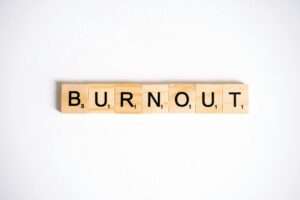
We acknowledged that we were in burnout.
We stopped the immediate downward spiral, finishing the stress cycles.
We worked on identifying what was keeping us in quickstand.
From there, we triaged as much as we could out of our schedules, slashing away at commitments and drains.
But what if you can’t cut anything else out? What if you’ve got it down to bare essentials, like self-care, family, job… and it still seems like too much?
Lower. Your. Standards.
If you’re anything like the clients I’ve worked with over the years, and especially if you’re neurodivergent, you may have… well, let’s call them “perfectionist tendencies.”
I’m going to leave the day job stuff alone, because that’s difficult, and only you can decide how you want to negotiate it, especially since the financial well-being of you and possibly your family are involved.
For family and self-care… remember in the last newsletter, when I suggested that you might need to make non-ideal choices to get to a place of stability?
This is an expansion of that.
Doing what you can is more than enough.
“Remember that anything worth doing is worth doing half-assed.”
–KC Davis, How to Keep House While Drowning
This might mean you eat on paper plates a lot, landfill be damned.
This might mean that the laundry doesn’t get folded, period. If you need it to be wrinkle-free prior to going to the office, then into the dryer it goes for a few minutes. If you’re working at home… you may be in jammies or sweats a lot.
This might mean that you and your family have more take-out or frozen foods (or hell, cereal) for a while.
Having an open talk with them about your mental and emotional state (depending on their ages, etc.) might not be a bad idea — communication’s always valuable. But the important thing is that you get breathing room.
Especially for writing goals.
If you find writing replenishing, and hate that you stopped writing because of burnout, then by all means, keep writing.
But beware of this gremlin that might be hiding deep within your psyche. You know the one. It whispers, “sure, the writing’s fun and replenishing and all… but you’re not getting enough done, and you’re trying to build your writing career, and if you don’t do it you’re going to tank your career and be left behind…”
A small amount of writing is quite literally better than nothing if you find it replenishing.
That said, if you need rest, GIVE YOURSELF GRACE AND LET YOURSELF REST.
Sorry for the all caps (but not really.) But it’s a crucial point. Too many of us don’t realize that you do not need to “write every day” to be a writer. (I hate that I once used that as a title for algorithm purposes!)
If you need to rest and refill the well, let yourself do that.
You may feel guilty.
I imagine a lot of people are recoiling at this point, thinking good God, this is horrible. What would people say, if they saw me doing this? What would they think?
The next thought might be: I’m not that bad! I can function, for pity’s sake!
I would strongly urge you to assess if it isn’t, after all, that bad. After all, you may not need this level of shut down. But you might, and you’re the only one who can make that distinction.
Further, I would not let anyone, including yourself, judge you as “lazy” for needing time. The people who press past their barriers in a pursuit of impressing either external forces or internal judges tend to be the ones who quite frankly break.
If it makes you feel better, put a tentative end date: I am going to be in burnout/survival recovery for x weeks. Then revisit and see how you’re feeling. Get a lot of sleep, take steps toward rest and replenishment.
Recovery.
As you feel better, you can perhaps create systems or workarounds that prevent total burnout in the future. Maintenance and prevention tends to be more effective, and takes less energy, than complete shut down and reboots.
Burnout is not a moral issue.
You’re not a bad person if you’re dealing with burnout. It happens to all of us, especially in today’s world, from what I’ve seen.
You are certainly not a bad person for doing what it takes to get out of it. Be gentle with yourself, like you would be with anyone else that you knew who was going through it.
That wraps up this topic.
Next month will actually tie into these issues, although the focus will be on time management and “life” management systems for writers, leading into a new course in December. If there’s anything you’d love to see, please let me know!
